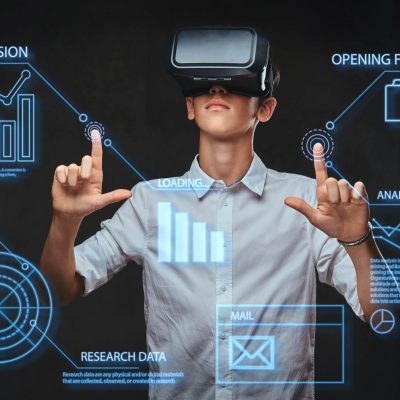Technology has reshaped the marketing landscape in ways that were unimaginable just a decade ago. From AI-powered analytics to personalized automation and immersive digital experiences, tech-driven marketing is no longer optional—it’s essential. Businesses of all sizes are leveraging innovative tools to reach, engage, and convert customers more effectively.
In this article, we’ll explore how technology is transforming modern marketing, the latest trends leading the charge, and what businesses need to know to stay competitive in a digitally dominated world.
1. The Evolution of Marketing in the Digital Age
Traditional marketing once relied heavily on print media, TV, and radio. While those channels still exist, digital marketing has taken center stage. The rise of social media, smartphones, and e-commerce has redefined how brands interact with consumers.
Modern marketing is now data-driven, customer-focused, and technology-enhanced. It’s about understanding customer behavior, predicting their needs, and delivering personalized messages at exactly the right moment.
This shift from “spray-and-pray” advertising to precision-targeted strategies is made possible by cutting-edge technologies such as artificial intelligence, machine learning, cloud computing, and big data analytics.
2. Artificial Intelligence: The Marketer’s Smartest Ally
Artificial Intelligence (AI) is perhaps the most significant tech disruptor in marketing today. It powers everything from chatbots to predictive analytics and dynamic ad creation.
How AI is used in marketing:
-
Customer segmentation: AI analyzes user behavior and demographics to create precise customer segments.
-
Predictive analytics: Forecasts future buying behavior based on historical data.
-
Personalization: Recommends products and content tailored to individual users (e.g., Netflix, Amazon).
-
Chatbots: Provide 24/7 customer service, increasing engagement and conversion rates.
-
Ad optimization: AI dynamically tests and optimizes ads for better performance.
AI not only increases efficiency but also reduces costs and improves decision-making, giving marketers a competitive edge.

3. Marketing Automation: Doing More with Less
Automation is a cornerstone of modern marketing, enabling teams to execute complex campaigns with minimal manual effort.
Popular marketing automation tools like HubSpot, Mailchimp, ActiveCampaign, and Marketo help with:
-
Email marketing workflows
-
Lead scoring and nurturing
-
Social media scheduling
-
CRM integration
-
A/B testing and analytics
By automating repetitive tasks, businesses can focus on strategy and creativity, improving both efficiency and ROI. Automation also allows for real-time responses, which is crucial in today’s fast-paced digital environment.
4. Big Data and Analytics: Fueling Informed Decisions
In tech/marketing, data is king. Every click, scroll, like, and share generates valuable insights. The ability to collect, analyze, and act on this data in real-time gives businesses a distinct advantage.
Key benefits of big data in marketing:
-
Deeper customer insights: Understand preferences, habits, and pain points.
-
Performance tracking: Evaluate campaign success with detailed metrics.
-
Better targeting: Deliver ads to the right audience at the right time.
-
Trend spotting: Identify market opportunities before competitors.
Modern analytics platforms like Google Analytics 4, Hotjar, Tableau, and Mixpanel provide visual dashboards and real-time reporting to guide strategic decisions.
5. Personalization at Scale
Consumers today expect tailored experiences. Personalization goes beyond using someone’s name in an email—it’s about curating content, offers, and experiences that resonate with each individual.
With the help of AI and machine learning, companies can:
-
Recommend products based on browsing history
-
Trigger behavior-based emails (abandoned cart, birthday offers)
-
Display personalized website content based on location or device
-
Serve dynamic ads tailored to user interests
Brands that master personalization can build stronger customer loyalty, increase conversions, and create more meaningful connections.
6. Voice and Visual Search: The New Frontiers
With the rise of smart speakers and visual recognition, consumers are searching in new ways—and marketers need to keep up.
Voice search:
More people are using devices like Amazon Alexa, Google Assistant, and Apple Siri to find information hands-free. This means optimizing content for natural language and long-tail keywords is now essential.
Visual search:
Platforms like Pinterest Lens and Google Lens allow users to search using images instead of words. Retailers can tap into visual search by using high-quality product images, tagging metadata properly, and incorporating AR experiences.
These technologies enhance user experience and open up new opportunities for brand discovery and engagement.
7. Social Media and Influencer Tech
Social media remains a powerful channel, but the way brands use it is evolving. Algorithms now prioritize content that drives engagement, which is where influencers and micro-influencers come in.
Tech advancements in social media marketing:
-
AI-powered analytics for influencer performance
-
Live video and AR filters for deeper engagement
-
Social commerce integrations for direct shopping on platforms like Instagram and TikTok
Brands are now using AI tools to identify the best influencers for their audience and to measure campaign impact with precise metrics.
8. Blockchain and Privacy-Centric Marketing
As data privacy becomes a global concern, technologies like blockchain are gaining relevance in marketing.
Blockchain can:
-
Enhance transparency in digital ad buying
-
Combat ad fraud
-
Give consumers control over their personal data
Additionally, regulations like GDPR and CCPA require marketers to be more careful about how they collect and use data. Privacy-first marketing tools, cookie-less tracking, and ethical data usage are becoming the norm.
9. Immersive Technologies: AR and VR Marketing
Augmented Reality (AR) and Virtual Reality (VR) are changing how brands engage consumers.
-
AR allows users to “try before they buy” (e.g., glasses, makeup, furniture).
-
VR creates immersive brand experiences, like virtual tours or interactive storytelling.
Brands like IKEA, L’Oréal, and Nike are already leveraging these tools to stand out in crowded markets and enhance the customer journey.
10. Preparing for the Future: What Marketers Should Do
As the tech/marketing space evolves, here are key strategies to future-proof your efforts:
-
Stay current with technology trends: Subscribe to tech marketing blogs, attend webinars, and explore new platforms.
-
Invest in training: Ensure your team is skilled in the latest tools, from AI to analytics.
-
Be data-ethical: Prioritize transparency and user consent in all data-related practices.
-
Test and experiment: Use A/B testing and agile marketing methods to continuously optimize your campaigns.
-
Balance automation with human touch: While tech is essential, authentic storytelling and human connection remain irreplaceable.

Conclusion
The integration of technology and marketing is not just a trend—it’s a fundamental shift in how brands operate and grow. With tools like AI, big data, automation, and immersive experiences, marketers have the power to connect with consumers in smarter, faster, and more impactful ways.
However, with great power comes great responsibility. The most successful tech-driven marketing strategies will be those that combine innovation with ethics, personalization with privacy, and automation with empathy.
As we look ahead, one thing is clear: the future of marketing belongs to those who embrace technology while staying true to the core values of connection, trust, and creativity.






